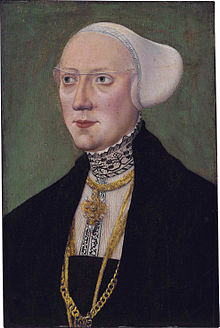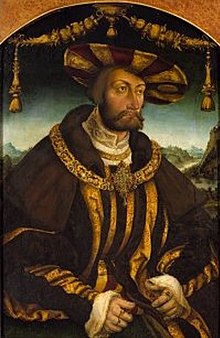Wilhelm IV. (Bavaria)
Wilhelm IV the steadfast (born November 13, 1493 in Munich ; † March 7, 1550 ibid) was Duke of Bavaria from 1508 to 1550. His rule established Bavaria's position as a bulwark of the Counter-Reformation in Germany, which is where his nickname comes from, and was just as significant for the beginnings of Renaissance art in Bavaria.
Early years and beginning of government
His parents were Duke Albrecht IV and Kunigunde of Austria . Wilhelm only ruled under the tutelage of his uncle Wolfgang , and from 1511 independently with Leonhard von Eck as his leading advisor. In 1509, Johannes Aventinus was entrusted with the education of his two younger brothers Ludwig and Ernst .
In 1508 the rights of the estates for the Duchy of Bavaria were determined in the so-called "Declared State Freedom". Wilhelm's attempt to subsequently break the power of the estates failed because his younger brother Ludwig X also opposed him. According to the will of his father, who had passed a primogeniture law in 1506 , Wilhelm was to rule Bavaria alone. When Ludwig came of age, he nevertheless raised claims to co-government on the grounds that he had been born before the inheritance was settled and asked Emperor Maximilian I for help. The landscape feared a new edition of the Landshut War of Succession . At her urging, Wilhelm accepted the co-government on February 17, 1514. However, he soon moved away from it and prepared to argue against his brother. Emperor Maximilian then issued an arbitration award in Innsbruck on September 29, 1514 , according to which Ludwig should receive the title of duke and a quarter of the territory of Bavaria. The brothers were soon suspicious of the emperor, who had already paid dearly for his mediation in the Landshut War of Succession through ceded Bavarian territory in 1505 and came to an agreement on their return on October 14, 1514 in Rattenberg (one of the formerly Bavarian places then lost to Maximilian ) different: Wilhelm was supposed to rule the districts of the rent offices of Munich and Burghausen from Munich , Ludwig von Landshut the districts of Landshut and Straubing and thus a third of the duchy. This division of power actually worked; there were only insignificant differences of opinion in the future. Wilhelm also recognized the co-rule of the estates until he was 24 years old.
However, the failed marriage of his sister Sabina von Bayern led to a long-term conflict with Württemberg from 1517 onwards .
Government and religious policy
On April 23, 1516, he and his brother Ludwig issued a new Bavarian state order . In this, among other things, the price and the ingredients of beer were regulated (→ Purity Law ). That is why April 23rd has been celebrated by the German Brewers' Association since 1994 as the day of German beer . In 1518 he published a land law reform and in 1520 he introduced the first uniform court system in Bavaria.
The excommunication against Martin Luther , he was just like his brother did not initially enforced. On May 25, 1521, however, the brothers announced the Edict of Worms in Munich and Landshut. From then on, Luther's followers were arrested and expelled from the country. With the Grünwald Conference , which took place at Grünwald Castle in February 1522 , an event in Grünwald's history gained European significance. At this conference the brothers Wilhelm and Ludwig agreed that Bavaria should continue to belong to the “old faith” in future, but that the church should be reformed. This decision is understood today as the beginning of the Counter-Reformation in the empire and the Habsburg lands and had an impact that would shape the history of Europe over the next few centuries.
Wilhelm allowed himself to be won over to the cause of Catholicism by Pope Clement VII in 1524 by assigning sovereign rights over the Bavarian bishops and the income of the church institutes and was one of the most ardent opponents of the Reformation , which he did not allow to arise in his country. The Eck Bible was created by Johannes Eck on behalf of Wilhelm . In 1526, the duke enforced a class tax which stipulated that it could not be passed on to the bottom. The University of Ingolstadt was made the refuge of Catholic reform through the appointment of the Jesuits. With Protestantism, Bavarian farmers also questioned the existing system and their limited rights in the event of high taxes. At the beginning of 1525, Allgäu farmers' associations presented twelve articles with demands, which then quickly spread. Because the Bavarian Chancellor Leonhard Eck does not want to recognize them, there are fights in which the Franconian farmers also participate. Castles are devastated, but after a short time the farmers have to surrender. The fact that large parts of Bavaria were largely spared from unrest is mainly due to the more secure position and integration of the farmers there. In addition, the Bavarian government took counter-Reformation measures at an early stage , peasant protests and reform efforts were nipped in the bud early on.
After the childless King Ludwig II of Bohemia and Hungary fell in 1526, envoys from the Bohemian nobility asked Wilhelm's brother, Duke Ludwig X, to apply for the Bohemian crown. He was quite interested, but was subject to the Habsburg and later Emperor Ferdinand in the election by the estates . Wilhelm and Ludwig then supported Ferdinand's opponent Johann Zápolya in the hope of reducing the influence of the Habsburgs. It was not until 1534 that the brothers reached an agreement with the Habsburgs in Linz .
In 1530, Duke Wilhelm offered the Bishop of Freising Philipp large parts of the country between Isar and Amper in exchange for the entire County of Werdenfels , but negotiations in Munich failed. Instead, the Duke was able to move the border in favor of Bavaria in 1539.
Despite Bavaria's official neutrality, Wilhelm took part in the Schmalkaldic War in 1546–47 on the basis of a secret treaty on the part of Charles V. However, he did not succeed in winning the Palatinate electoral dignity . As early as 1537, Wilhelm Ingolstadt had Reinhard zu Solms develop it into a Bavarian state fortress, which then passed its first practical test in this conflict.
Ludwig X. died in 1545 without a legal successor, so that after his death his brother Wilhelm was able to take over sole rule over Bavaria again. This was the final end of the division of Bavaria. Wilhelm died five years later, his son Albrecht V was the sole successor in 1550 .
Cultural policy and art funding
The rule of Wilhelm and his equally art-loving brother Ludwig marked the beginning of the Renaissance in the Duchy of Bavaria. Wilhelm von Alten Hof was the first Wittelsbacher to finally move to Neuveste, the original building of the Munich Residence . He had Albrecht Altdorfer decorate his new domicile in 1528 with his painting The Battle of Alexander . Wilhelm also sponsored Barthel Beham , Hans Mielich and other artists. The history of the Alte Pinakothek began with his collection of paintings . The history of the Bavarian State Orchestra began with the appointment of Ludwig Senfl . Dachau Castle was expanded and became the preferred summer residence.
Marriage and offspring

Duke Wilhelm IV married Princess Maria Jakobäa von Baden (1507–1580), daughter of Margrave Philip I of Baden and his wife Princess Elisabeth of the Palatinate , on October 5, 1522 in Munich . The marriage had four children:
- Theodor (1526–1534)
- Albrecht V of Bavaria (1528–1579) ⚭ 1546 Archduchess Anna of Austria (1528–1590), daughter of Emperor Ferdinand I
- Wilhelm (1529–1530)
- Mechthild of Bavaria (1532–1565) ⚭ 1557 Margrave Philibert of Baden (1536–1569)
A son came from an extramarital relationship with Margarete Hausner von Stettberg:
- Knight Georg von Hegnenberg (* around 1509; † 1589 or 1596)
family tree
|
Ernst Duke of Bavaria-Munich |
Elisabetta Visconti |
Erich I. Duke of Braunschweig-Grubenhagen |
Elisabeth of Göttingen |
Ernst the Iron Duke of Styria, Carinthia and Carniola |
Cimburgis of Mazovia |
Edward King of Portugal |
Eleanor of Aragon | ||||||||||||||||||||||||||||||||||||||||||||||||||||||
|
Albrecht III. Duke of Bavaria-Munich |
Anna of Braunschweig-Grubenhagen |
Friedrich III. Roman-German Emperor |
Eleonore Helena of Portugal | ||||||||||||||||||||||||||||||||||||||||||||||||||||||||||
|
Albert the Wise Duke of Bavaria |
Kunigunde of Austria | ||||||||||||||||||||||||||||||||||||||||||||||||||||||||||||
| William IV | |||||||||||||||||||||||||||||||||||||||||||||||||||||||||||||
literature
- Sigmund Ritter von Riezler : Wilhelm IV. In: General German Biography (ADB). Volume 42, Duncker & Humblot, Leipzig 1897, pp. 705-717.
- Wilhelm IV., Bavarian. Duke. In: Karl Bosl (ed.): Bosls Bavarian biography. Pustet, Regensburg 1983, ISBN 3-7917-0792-2 , p. 847 ( digitized version ).
- Wolf Weigand : Wilhelm IV, Bavarian Duke. In: Biographisch-Bibliographisches Kirchenlexikon (BBKL). Volume 13, Bautz, Herzberg 1998, ISBN 3-88309-072-7 , Sp. 1217-1221.
Web links
- Portrait diptych - Left panel: Portrait of Duke Wilhelm IV of Bavaria. In: History of Bavaria. Exhibition Bavaria Pictures. House of Bavarian History, accessed March 8, 2013 .
Individual evidence
- ↑ The German Baunerkrieg fight for the "old law". Retrieved November 18, 2017 .
| predecessor | Office | successor |
|---|---|---|
| Albrecht IV. |
Duke of Bavaria 1508–1550 |
Albrecht V. |
| personal data | |
|---|---|
| SURNAME | William IV |
| ALTERNATIVE NAMES | Wilhelm the steadfast |
| BRIEF DESCRIPTION | Duke of Bavaria (1508–1550) |
| DATE OF BIRTH | November 13, 1493 |
| PLACE OF BIRTH | Munich |
| DATE OF DEATH | March 7, 1550 |
| Place of death | Munich |

